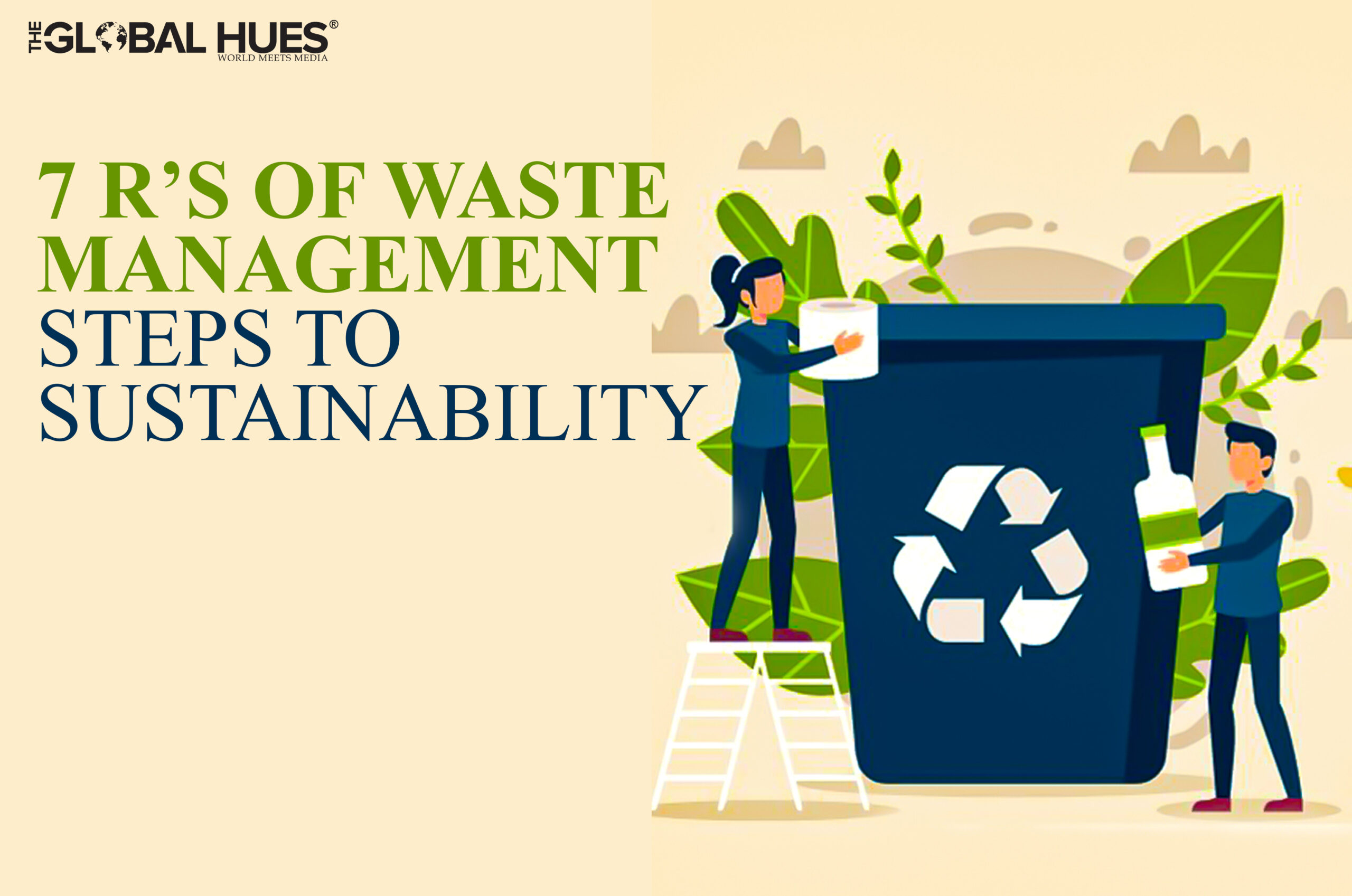Discover
-
What single-use items do you frequently use in your daily life?
-
Can you identify any items in your home that you regularly discard but could be repurposed or reused in some way?
-
What were the original 3Rs of Waste Management?
We all are consumers! What we purchase and how we dispose of waste can harm the environment. A big of saving the environment is choosing the kind of consumer we are going to be. People concerned about the environment think about the environmental impact of what they purchase and whether they need to buy at all.
“Sustainability is no longer about doing less harm. It’s about doing more good.” Initially, being sustainable was about not causing too much damage to the environment. However, now the idea is to find ways to help the environment and society thrive.
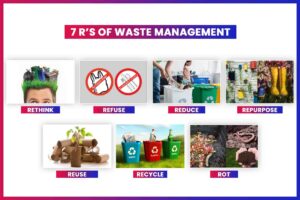
The Evolution Of Waste Management: From 3R’s to 7R’s
For years, the 3Rs: Reduce, Reuse, and Recycle were the mantra, people followed to minimise waste.
Here is a brief about the Original 3Rs:
- Reduce: It means buying only what you need and avoiding single-use items.
- Reuse: It refers to repurposing containers, repairing clothes and donating usable items.
- Recycle: Processing materials like paper, plastic, metal, and glass into new products.
However, the 3Rs are now modified into the 7Rs of waste management. Let’s understand them more briefly.
7R’s of Waste Management
In more recent years, the 3R’s have expanded to become the 7Rs. Rethink, Refuse, Reduce, Repurpose, Reuse, Recycle and Rot! All these 7 concepts are focused on minimising waste and taking steps towards sustainability. When you work your way through all of them, you will be well on your way to saving the environment and living a zero-waste life.
Rethink
What do you do when you get your salary? The first thing that comes to mind is to buy things. It can be anything like buying clothes, food items, or accessories. Every time, you go shopping to buy new clothes or gadgets, do you think if you really need them? Will you actually use that dress or accessory you’re about to buy? Instead of always buying new, consider choosing second-hand items. This way you will save resources and things from going into the trash pile.
When you talk about waste management, rethink is a mindset to reduce waste. How do you implement this mindset in your daily life? Here are some of the ways to include this mindset:
- When you go shopping, bring your own shopping bags to avoid single-use plastic.
- While on a shopping trip, think about what you need.
- Additionally, instead of buying things from a popular brand, go for local products.
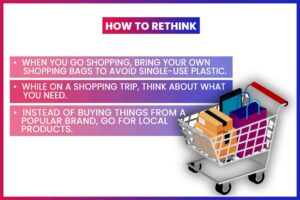
It helps you shorten the supply chain, decrease transportation energy and use of packaging, and at the same time support small entrepreneurs. Moreover, in today’s time, there are a lot of DIYs through which you can create new things from your old items.
Refuse
Refuse is the second element of 7R’s of hierarchy. It can effectively help to minimise waste. Well, refusing waste can take some practice; keep refusing to buy wasteful and non-recyclable products. Here are a few ways you can include refuse in your daily life.
- When you go out to buy vegetables, bring your bag.
- Refuse to take vegetables in a plastic bag.
- Avoid asking for extra cutlery when you are ordering things online.
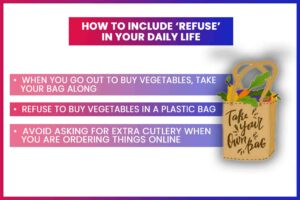
Moreover, refusing also extends to reducing overconsumption, adopting minimalism, and prioritising conscious consumption. It also involves rejecting products that contain toxic chemicals that harm the environment and human health. Furthermore, by practising refusing you are making smarter purchasing decisions and setting some standards that make you more environmentally responsible.
Reduce
Try to reduce the use of harmful, wasteful, and non-recyclable products. When you reduce dependency on these kinds of products, it leads to less waste material ending up in a landfill. Always use the minimum amount required to avoid unnecessary waste.
When you reduce the amount of a consumable that you use, will in turn reduce the amount of packaging that you are throwing away. Not all packaging is recyclable, so you need to think smartly.
Here are some of the ways to include the habit of ‘reduce’ in your daily life:
- Purchase products that last longer and have eco-friendly packaging.
- Buy in bulk.
- Buy unpackaged fruits and vegetables.
- Bring in your produce bags at the store.
- Using two-sided printing when possible.
- Opt for paperless billing.
- Using cloth napkins and cloths instead of paper ones.
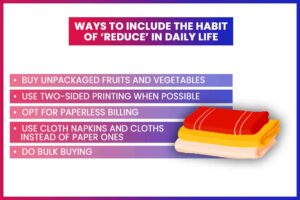
Repurpose
Imagine buying an item that you think you need, but it doesn’t fulfil its purpose now. Rather than throwing them away, you can repurpose them. Moreover, some products cannot be refused, reduced, or reused. The best way to use these items is to repurpose them. It needs some creativity, but the possibilities are endless.
Examples of Repurposing Items:
- Old newspapers and magazines for art & craft
- Glass jars and plastic bottles for planting new seeds
- Old and chipped coffee mugs for holding pens
- Compost from leftover vegetable and fruit peels
- Old clothing and bedding can be turned into cleaning rags
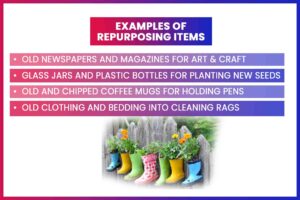
Moreover, there are a lot of videos online that help you understand how to repurpose items which cannot be recycled.
Reuse
Single-use plastics have introduced a throw-away culture; it has normalized the consumer behaviour of using materials once and then throwing them away. Instead of buying new items, reuse things that you already have.
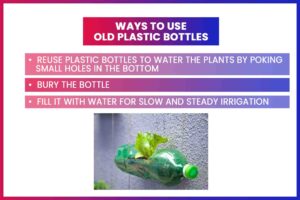
You can start by replacing all single-use eating utensils, water bottles, styrofoam cups, and paper plates with compostable or reusable alternatives. Moreover, you can reuse plastic bottles to water the plants by poking small holes at the bottom and burying it and then filling them with water for slow and steady irrigation.
Recycle
Even if you dispose of your waste correctly, you never know where it will end up, so recycle where you can, even before generating the waste. One of the ways to properly recycle is to put the waste in the designated bins. There are three types of recycling bins:
- First is the Blue bin used for recycling paper.
- Second is the Green bin used for recycling plastic and glass.
- Third is the Yellow bin used for recycling cartons, plastic bottles and cans.
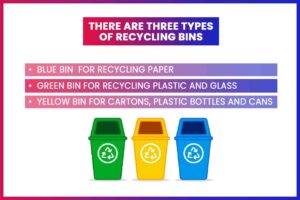
In comparison to making a new plastic product, recycling uses less water, fossil fuel, and resource extraction. Keep in mind, that plastic can only be down-cycled.
Did you know that when a newspaper gets recycled it gets turned into paper plates, construction paper, notebooks, craft papers, and more? Just like this, it is important to use recyclable materials in your everyday life to ensure that nothing goes to waste or harms the environment.
Rot
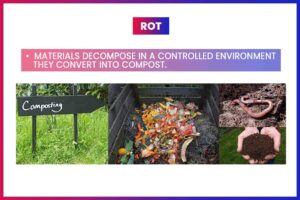
Take advantage of the natural decomposition process of nature to manage organic resources like food, tree limbs, scraps, etc. When such materials decompose in a controlled environment they convert into compost. Moreover, it is a quality soil amendment that can improve gardens and soil quality. Compost is called black gold as it helps plants retain moisture and gives them beneficial nutrients.
In Conclusion
Follow these 7 R’s in your daily life and see how every action you take towards a more sustainable life is helping out the planet. There are many waste management solutions to streamline the process; here are four applications that are spearheading changes in waste management:
- Pom-Pom Trash to Cash: You can sell anything through this remotely recyclable app and set a price per kg for it. You just need to set up a request, and a team from Pom Pom will come to collect it. They send off the waste to industries that collect such waste to recycle and reuse.
- Sellixo: With Sellixo, you can sell your dry waste like paper, plastic, or metal and get paid for it. This was coded by a group of five 14-year-old girls who won Rs 6.4 lakhs at the Technovation Challenge that year.
- Ecolekt: Ecolekt can help you when you do not know what you want to do with your old laptops or phones. A Bangalore-based company Jogiv launched this app to manage the rising e-waste problem in the city.
- Encashea: Founded in 2015, Encashea is based in Bangalore. Under the app, the team ties up with vendors who buy scrap and lists the prices on the app. They have a free doorstep service in the selected areas of Bangalore. You need to pre-book the service and choose a time from the available slots.
Annie Leonard has rightly said, “There is no such thing as away, when we throw anything away, it must go somewhere.”
Frequently Asked Questions Related to Waste Management
What are the examples of 7 Rs of Waste Management?
The examples of the seven ‘R’ of waste management are:
- Rethink
- Refuse
- Reduce
- Repurpose
- Reuse
- Recycle
- Rot
What are the five examples of reduce?
These are examples of Reduce:
- Always buy in bulk to reduce packaging
- Carry useable bags to carry your purchase home
- Purchase a reusable water bottle
- Choose to become paperless and rely on online bills
What are the examples of waste management systems?
Here is a list of waste management systems:
- Landfilling
- Incineration
- Recycling
- Composting
- Source reduction
- Waste-to-Energy
What is 3R to 7R?
The 3Rs were Reduce, Recycle, and Reuse. In addition to this, the 7Rs are Rethink, Refuse, Reduce, Repurpose, Reuse, Recycle, and Rot.
What do you mean by sustainability?
Sustainability means meeting our needs without compromising the ability of future generations to meet their own needs.
What are the three pillars of sustainability?
The three pillars of sustainability are environmental, social, and economic.
What are the examples of reuse?
Here are the examples of reuse:
- You can repurpose the 5 or 10-litre plastic oil cans into a watering can.
- Add colour to the egg cartons and use it as a handy organiser in your drawers.
- You can create your own DIY coffee scrub by mixing the used coffee grounds
- Put a unique twist by wrapping the gifts in the glossy magazine pages.
- Repurpose your old jeans into a brand-new tote bag.

